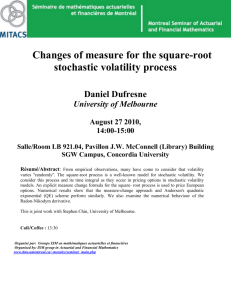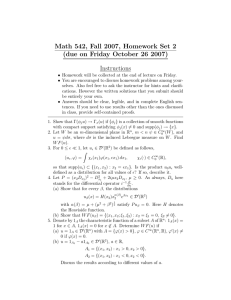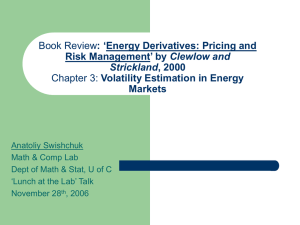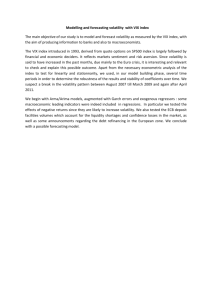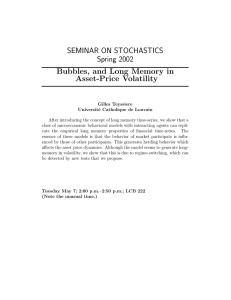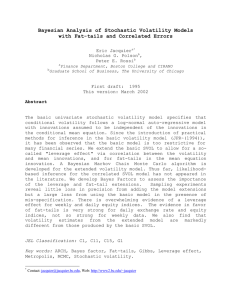Small time asymptotics for fast mean-reverting stochastic volatility models Rohini Kumar
advertisement
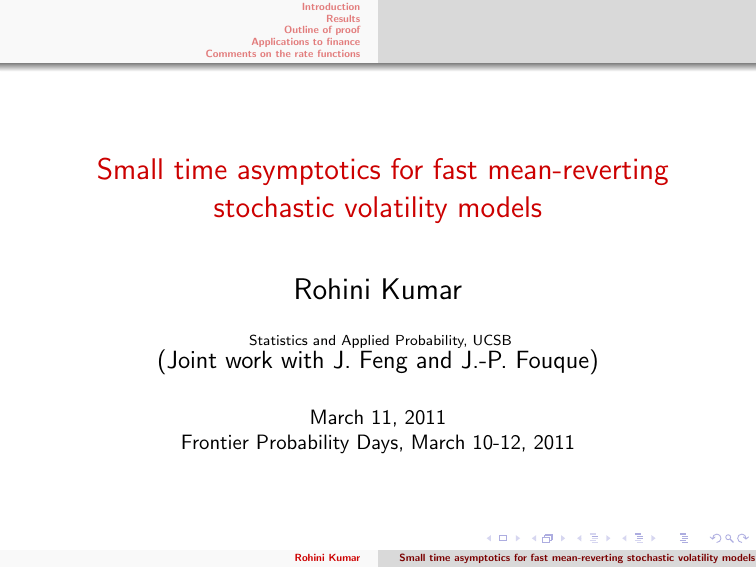
Introduction
Results
Outline of proof
Applications to finance
Comments on the rate functions
Small time asymptotics for fast mean-reverting
stochastic volatility models
Rohini Kumar
Statistics and Applied Probability, UCSB
(Joint work with J. Feng and J.-P. Fouque)
March 11, 2011
Frontier Probability Days, March 10-12, 2011
Rohini Kumar
Small time asymptotics for fast mean-reverting stochastic volatility models
Introduction
Results
Outline of proof
Applications to finance
Comments on the rate functions
1
Introduction
Motivation - finance problem
Stock price model
2
Results
LDP
Ultra-fast mean-reversion regime
Slower mean-reversion regime
3
Outline of proof
Bryc’s lemma
PDE
Convergence of viscosity solutions
4
Applications to finance
Option pricing
Implied Volatility
5
Comments on the rate functions
Rohini Kumar
Small time asymptotics for fast mean-reverting stochastic volatility models
Introduction
Results
Outline of proof
Applications to finance
Comments on the rate functions
Motivation - finance problem
Stock price model
Background
Let St denote stock price at time t.
A European call option on this stock is a contract that gives its holder
the right, but not the obligation to buy a unit of this stock at a certain
price, called strike price, and at a given time called maturity time.
Rohini Kumar
Small time asymptotics for fast mean-reverting stochastic volatility models
Introduction
Results
Outline of proof
Applications to finance
Comments on the rate functions
Motivation - finance problem
Stock price model
Background
Let St denote stock price at time t.
A European call option on this stock is a contract that gives its holder
the right, but not the obligation to buy a unit of this stock at a certain
price, called strike price, and at a given time called maturity time.
Let K = strike price, T = maturity time and suppose S0 < K (
out-of-the- money).
Rohini Kumar
Small time asymptotics for fast mean-reverting stochastic volatility models
Introduction
Results
Outline of proof
Applications to finance
Comments on the rate functions
Motivation - finance problem
Stock price model
Question
What is the behavior of
option price = E [e −rT (ST − K )+ ]
as time to maturity T → 0?
Rohini Kumar
Small time asymptotics for fast mean-reverting stochastic volatility models
Introduction
Results
Outline of proof
Applications to finance
Comments on the rate functions
Motivation - finance problem
Stock price model
Question
What is the behavior of
option price = E [e −rT (ST − K )+ ]
as time to maturity T → 0?
To estimate this quantity, we study
P(ST > K )
as T → 0.
This probability decays exponentially fast to 0. We get a large deviation
estimate of the form
lim T log P(ST > K ) = −I (K )
T →0
Rohini Kumar
Small time asymptotics for fast mean-reverting stochastic volatility models
Introduction
Results
Outline of proof
Applications to finance
Comments on the rate functions
Motivation - finance problem
Stock price model
Black-Scholes model
A simple model for this stock price is the B-S model
dSt = rSt dt + σSt dWt ;
σ > 0 is called volatility.
Under the B-S model, the price of a call option with strike price K and
maturity time T is:
option price = E [e −rT (ST − K )+ ]
is easy to calculate.
However the assumption of constant volatility is unrealistic and we
instead work with a more sophisticated model.
Rohini Kumar
Small time asymptotics for fast mean-reverting stochastic volatility models
Introduction
Results
Outline of proof
Applications to finance
Comments on the rate functions
Motivation - finance problem
Stock price model
Stochastic volatility model for stock price
Let St denote stock price.
(1)
dSt = rSt dt + St σ(Yt )dWt ,
1
ν
(2)
dYt = (m − Yt )dt + √ Ytβ dWt .
δ
δ
(1a)
(1b)
where m ∈ R, r , ν > 0, W (1) and W (2) are standard Brownian motions
with hW (1) , W (2) it = ρt, with |ρ| < 1 constant.
-The process (Yt ) is a fast mean-reverting process with rate of mean
reversion 1/δ (δ > 0).
Rohini Kumar
Small time asymptotics for fast mean-reverting stochastic volatility models
Introduction
Results
Outline of proof
Applications to finance
Comments on the rate functions
Motivation - finance problem
Stock price model
Assumptions
We assume that
Assumption
1
2
3
β ∈ {0} ∪ [ 12 , 1);
in the case of β = 1/2, we require m > ν 2 /2 and Y0 > 0 a.s., in the
case of 1/2 < β < 1, we require m > 0 and Y0 > 0 a.s.;
σ(y ) ∈ C (R; R+ ) satisfies
σ(y ) ≤ C (1 + |y |σ ),
for some constants C > 0 and σ with 0 ≤ σ < 1 − β.
Rohini Kumar
Small time asymptotics for fast mean-reverting stochastic volatility models
Introduction
Results
Outline of proof
Applications to finance
Comments on the rate functions
Motivation - finance problem
Stock price model
Examples of Y process
Ornstein-Uhlenbeck process (take β = 0)
dYt =
1
ν
(2)
(m − Yt )dt + √ dWt .
δ
δ
CIR process (take β = 1/2)
dYt =
1
ν p
(2)
(m − Yt )dt + √
Yt dWt .
δ
δ
Rohini Kumar
Small time asymptotics for fast mean-reverting stochastic volatility models
Introduction
Results
Outline of proof
Applications to finance
Comments on the rate functions
Motivation - finance problem
Stock price model
Rescaling time
Let Xt = log St . Rescale time t 7→ t.
√
1
(1)
dX,t = r − σ 2 (Y,t ) dt + σ(Y,t )dWt
2
r
β
(2)
Y dWt .
dY,t = (m − Y,t )dt + ν
δ
δ ,t
(2a)
(2b)
Our mean-reversion time δ is -dependent.
Rohini Kumar
Small time asymptotics for fast mean-reverting stochastic volatility models
Introduction
Results
Outline of proof
Applications to finance
Comments on the rate functions
Motivation - finance problem
Stock price model
Rescaling time
Let Xt = log St . Rescale time t 7→ t.
√
1
(1)
dX,t = r − σ 2 (Y,t ) dt + σ(Y,t )dWt
2
r
β
(2)
Y dWt .
dY,t = (m − Y,t )dt + ν
δ
δ ,t
(2a)
(2b)
Our mean-reversion time δ is -dependent.
Consider 2 regimes:
δ = 4 (ultra-fast regime)
δ = 2 (fast regime)
Rohini Kumar
Small time asymptotics for fast mean-reverting stochastic volatility models
Introduction
Results
Outline of proof
Applications to finance
Comments on the rate functions
Motivation - finance problem
Stock price model
Rescaling time
Let Xt = log St . Rescale time t 7→ t.
√
1
(1)
dX,t = r − σ 2 (Y,t ) dt + σ(Y,t )dWt
2
r
β
(2)
Y dWt .
dY,t = (m − Y,t )dt + ν
δ
δ ,t
(2a)
(2b)
Our mean-reversion time δ is -dependent.
Consider 2 regimes:
δ = 4 (ultra-fast regime)
δ = 2 (fast regime)
As → 0, we look at small time asymptotics of X process but large time
asymptotics of the Y process. Y is mean-reverting and ergodic and
approaches its invariant distribution in large time. The effect of Y gets
averaged!
Rohini Kumar
Small time asymptotics for fast mean-reverting stochastic volatility models
Introduction
Results
Outline of proof
Applications to finance
Comments on the rate functions
LDP
Ultra-fast mean-reversion regime
Slower mean-reversion regime
Large Deviation Principle (LDP)
Let X,0 = x. We prove the following large deviation estimates of the
probabilities of {X,t > x 0 } when x 0 > x.
THEOREM
lim log P(X,t > x 0 ) = −I (x 0 ; x, t)
→0
with rate functions I (x 0 ; x, t) as follows.
Rohini Kumar
Small time asymptotics for fast mean-reverting stochastic volatility models
Introduction
Results
Outline of proof
Applications to finance
Comments on the rate functions
LDP
Ultra-fast mean-reversion regime
Slower mean-reversion regime
Rate function (δ = 4 case)
When δ = 4 ,
I (x 0 ; x, t) =
|x − x 0 |2
,
2σ̄ 2 t
where σ̄ 2 is the average of the volatility function σ(y ) with respect to the
invariant distribution of Y .
Rohini Kumar
Small time asymptotics for fast mean-reverting stochastic volatility models
Introduction
Results
Outline of proof
Applications to finance
Comments on the rate functions
LDP
Ultra-fast mean-reversion regime
Slower mean-reversion regime
Rate function (δ = 2 case)
When δ = 2 ,
x − x0 I (x 0 ; x, t) = t sup p
− H̄0 (p)
t
p∈R
where
H̄0 (p) =
lim T −1 log E [e 2 p
1
2
RT
0
σ 2 (Ysp )ds
T →+∞
|Y0p = y ].
Y p is the process with the perturbed Y process with generator B p
B p g (y ) = Bg (y ) + ρσνy β p∂y g (y ),
(3)
where B is the generator of the Y process.
Rohini Kumar
Small time asymptotics for fast mean-reverting stochastic volatility models
Introduction
Results
Outline of proof
Applications to finance
Comments on the rate functions
Bryc’s lemma
PDE
Convergence of viscosity solutions
Problem
Two aspects to this problem:
It is a Large Deviation problem coupled with a homogenization problem.
Rohini Kumar
Small time asymptotics for fast mean-reverting stochastic volatility models
Introduction
Results
Outline of proof
Applications to finance
Comments on the rate functions
Bryc’s lemma
PDE
Convergence of viscosity solutions
Key Steps in Proof
Prove convergence of the following functionals
−1
uh (t, x, y ) := log E [e h(X,t )
|X,0 = x, Y,0 = y ],
h ∈ Cb (R)
to u0h (t, x).
Rohini Kumar
Small time asymptotics for fast mean-reverting stochastic volatility models
Introduction
Results
Outline of proof
Applications to finance
Comments on the rate functions
Bryc’s lemma
PDE
Convergence of viscosity solutions
Key Steps in Proof
Prove convergence of the following functionals
−1
uh (t, x, y ) := log E [e h(X,t )
|X,0 = x, Y,0 = y ],
h ∈ Cb (R)
to u0h (t, x).
Prove exponential tightness of {X,t }>0 , i.e. for any α > 0 there
exists a compact set Kα ⊂ R such that
lim log P(X,t ∈
/ Kα ) ≤ −α.
→0
Rohini Kumar
Small time asymptotics for fast mean-reverting stochastic volatility models
Introduction
Results
Outline of proof
Applications to finance
Comments on the rate functions
Bryc’s lemma
PDE
Convergence of viscosity solutions
Key Steps in Proof
Prove convergence of the following functionals
−1
uh (t, x, y ) := log E [e h(X,t )
|X,0 = x, Y,0 = y ],
h ∈ Cb (R)
to u0h (t, x).
Prove exponential tightness of {X,t }>0 , i.e. for any α > 0 there
exists a compact set Kα ⊂ R such that
lim log P(X,t ∈
/ Kα ) ≤ −α.
→0
Then, by Bryc’s inverse Varadhan lemma, {X,t }>0 satisfies a LDP with
I (x 0 ; x, t) := sup {h(x 0 ) − u0h (t, x)}.
h∈Cb (R)
Rohini Kumar
Small time asymptotics for fast mean-reverting stochastic volatility models
Introduction
Results
Outline of proof
Applications to finance
Comments on the rate functions
Bryc’s lemma
PDE
Convergence of viscosity solutions
Convergence of u
Fix h ∈ Cb (R). How do we prove
u (t, x, y ) := log E [e −1
h(X,t )
|X,0 = x, Y,0 = y ]
converges?
Rohini Kumar
Small time asymptotics for fast mean-reverting stochastic volatility models
Introduction
Results
Outline of proof
Applications to finance
Comments on the rate functions
Bryc’s lemma
PDE
Convergence of viscosity solutions
Convergence of u
Possible ways:
Compute u and take limit.
Use PDE (viscosity solution) approach.
Operator-theoretic approach (See Feng and Kurtz [2]):
uh = S (t)h
is a nonlinear contraction semigroup.
Method: Let H denote nonlinear generator of S (t). Prove
H → H. Invoke Crandall-Liggett generation theorem to get the
limit semigroup S(t) corresponding to H.
A variational representation for S (t)h can be obtained. S (t) can
be interpreted as a Nisio semigroup.
Rohini Kumar
Small time asymptotics for fast mean-reverting stochastic volatility models
Introduction
Results
Outline of proof
Applications to finance
Comments on the rate functions
Bryc’s lemma
PDE
Convergence of viscosity solutions
PDE
u satisfies the following nonlinear pde:
∂t u = H u,
u(0, x, y ) = h(x),
in (0, T ] × R × E0 ;
(4a)
(x, y ) ∈ R × E0 .
(4b)
E0 is the state space of Y .
Rohini Kumar
Small time asymptotics for fast mean-reverting stochastic volatility models
Introduction
Results
Outline of proof
Applications to finance
Comments on the rate functions
Bryc’s lemma
PDE
Convergence of viscosity solutions
H
Let A denote the generator of the markov process (X,· , Y,· ). Then
−1
−1
H u(t, x, y ) = e − u A e u (t, x, y )
1
1
1
2
= (r − σ 2 )∂x u + σ 2 ∂xx
u + |σ∂x u|2
2
2
2
2 −−1 u −1 u
2
1
+ e
u + √ ∂x u∂y u)
Be
+ ρσ(y )νy β ( √ ∂xy
δ
δ
δ
(5)
where,
2 −−1 u −1 u
1
e
Be
= Bu + δ −1 |νy β ∂y u|2 .
δ
δ
2
Rohini Kumar
Small time asymptotics for fast mean-reverting stochastic volatility models
Introduction
Results
Outline of proof
Applications to finance
Comments on the rate functions
Bryc’s lemma
PDE
Convergence of viscosity solutions
u0 for δ = 4 case
We prove that as → 0, u → u0 where u0 satisfies the HJB equation
1
|σ̄∂x u0 (x)|2 ;
2
u0 (0, x) = h(x),
∂t u0 =
where σ̄ 2 is the average of σ 2 (·) with respect to the invariant distribution
of Y .
Rohini Kumar
Small time asymptotics for fast mean-reverting stochastic volatility models
Introduction
Results
Outline of proof
Applications to finance
Comments on the rate functions
Bryc’s lemma
PDE
Convergence of viscosity solutions
u0 for δ = 2 case
We prove that as → 0, u → u0 where u0 satisfies the HJB equation
∂t u0 = H̄0 (∂x u0 )
u0 (0, x) = h(x),
where
H̄0 (p) =
lim T −1 log E [e 2 p
1
T →+∞
Rohini Kumar
2
RT
0
σ 2 (Ysp )ds
|Y0p = y ].
Small time asymptotics for fast mean-reverting stochastic volatility models
Introduction
Results
Outline of proof
Applications to finance
Comments on the rate functions
Bryc’s lemma
PDE
Convergence of viscosity solutions
Rigorous proof of convergence of u
We use viscosity solution techniques adapted from Feng and Kurtz [2].
Difficulties:
In what sense do the operators H converge? How do we identify the
limit operator?
We are averaging over a non-compact space!
-We need to carefully choose suitable perturbed test functions in our
proof.
-The perturbed test functions f (t, x, y ) and H f (t, x, y ) should have
compact level sets.
Rohini Kumar
Small time asymptotics for fast mean-reverting stochastic volatility models
Introduction
Results
Outline of proof
Applications to finance
Comments on the rate functions
Bryc’s lemma
PDE
Convergence of viscosity solutions
Rigorous proof of convergence of u
We prove conditions for convergence of u , solutions (in the viscosity
solution sense) of
∂t u = H u,
to a sub-solution of
∂t u(t, x) ≤ inf H0 (x, ∇u(t, x), D 2 u(t, x); α),
α∈Λ
(8)
and a super-solution of
∂t u(t, x) ≥ sup H1 (x, ∇u(t, x), D 2 u(t, x); α).
α∈Λ
(9)
The method used is a generalization of Barles-Perthame’s half-relaxed
limit arguments first introduced in single scale, compact space setting
(see Fleming and Soner [3]).
Rohini Kumar
Small time asymptotics for fast mean-reverting stochastic volatility models
Introduction
Results
Outline of proof
Applications to finance
Comments on the rate functions
Option pricing
Implied Volatility
Asymptotics of option price
Consider an out-of-the-money European call option i.e.
S0 < K
or
x = log S0 < log K .
Lemma
lim log E [e −r t (S,t − K )+ ] = −I (log K ; x, t),
→0+
where I is the rate function for LDP of {X,t }>0 .
Rohini Kumar
Small time asymptotics for fast mean-reverting stochastic volatility models
Introduction
Results
Outline of proof
Applications to finance
Comments on the rate functions
Option pricing
Implied Volatility
Asymptotics of option price
Proof.
lim+ log E [e −r t (S,t − K )+ ] = lim+ log
→0
→0
= lim+ log
→0
≈ lim+ log
→0
=−
inf
z∈(K ,∞)
Z
∞
ZK∞
ZK∞
K
P(S,t > z)dz
P(X,t > log z)dz
I (log z; x, t)
dz
exp −
I (log z; x, t)
(by Laplace principle)
= −I (log K ; x, t)
as I is a continuous, increasing function in the interval (x, ∞).
Rohini Kumar
Small time asymptotics for fast mean-reverting stochastic volatility models
Introduction
Results
Outline of proof
Applications to finance
Comments on the rate functions
Option pricing
Implied Volatility
Details of this work can be found on http://arxiv.org/abs/1009.2782.
Our paper titled “Small time asymptotics for fast mean-reverting
stochastic volatility models” has been accepted (pending minor revisions)
in Annals of Applied Probability.
Rohini Kumar
Small time asymptotics for fast mean-reverting stochastic volatility models
Introduction
Results
Outline of proof
Applications to finance
Comments on the rate functions
Option pricing
Implied Volatility
References
J. Feng, M. Forde and J.-P. Fouque, Short maturity asymptotics for
a fast mean reverting Heston stochastic volatility model, SIAM
Journal on Financial Mathematics, Vol. 1, 2010 (p. 126-141)
J. Feng and T. G. Kurtz, Large Deviation for Stochastic Processes,
Mathematical Surveys and Monographs, Vol 131, American
Mathematical Society, 2006.
W. Fleming, H.M. Soner, Controlled Markov Processes and Viscosity
Solutions Second Edition, Springer, 2006.
I. Kontoyiannis and S. P. Meyn, Large Deviations Asymptotics and
the Spectral Theory of Multiplicatively Regular Markov Processes,
Electronic Journal of Probability, Vol. 10 (2005), (p. 61-123).
D. Stroock, An introduction to the Theory of Large Deviations.
Universitext, Springer-Verlag 1984, New York.
Rohini Kumar
Small time asymptotics for fast mean-reverting stochastic volatility models
Introduction
Results
Outline of proof
Applications to finance
Comments on the rate functions
Option pricing
Implied Volatility
Thank You!
Rohini Kumar
Small time asymptotics for fast mean-reverting stochastic volatility models
Introduction
Results
Outline of proof
Applications to finance
Comments on the rate functions
Option pricing
Implied Volatility
Black-Scholes model
A simple model for this stock price is the B-S model
dSt = rSt dt + σSt dWt ;
σ > 0 is called volatility.
Price of a call option with strike price K and maturity time T under this
model can be easily calculated:
E BS e −rT (ST − K )+
!
!
log(S0 /K ) + rT + 12 σ 2 T
log(S0 /K ) + rT − 12 σ 2 T
−rT
√
√
= S0 Φ
− Ke
Φ
σ T
σ T
(Black-Scholes Formula)
Rohini Kumar
Small time asymptotics for fast mean-reverting stochastic volatility models
Introduction
Results
Outline of proof
Applications to finance
Comments on the rate functions
Option pricing
Implied Volatility
Implied Volatility
Implied Volatility, Σ(T , K ), is the volatility parameter value to be
inputed in the Black-Scholes model to match a call option price.
Implied volatility for Black-Scholes model is a constant for all T and K .
However, implied volatilities of market prices are not constant and vary
with T and K . Keeping T fixed, the graph of implied volatilities of
market prices as a function of K is approximately U-shaped.
Rohini Kumar
Small time asymptotics for fast mean-reverting stochastic volatility models
Introduction
Results
Outline of proof
Applications to finance
Comments on the rate functions
Option pricing
Implied Volatility
Implied volatility
Let σ denote the implied volatility corresponding to strike price K of
option price given by our stochastic volatility model. Then σ is obtained
by solving:
!
!
1 2
1 2
σ
x
−
log
K
+
r
t
−
σ
t
t
x
−
log
K
+
r
t
+
2
2
√
√
− KΦ
e r t S0 Φ
σ t
σ t
I (log K ;x,t)
= E e −r t (S,t − K )+ ≈ e − Rohini Kumar
Small time asymptotics for fast mean-reverting stochastic volatility models
Introduction
Results
Outline of proof
Applications to finance
Comments on the rate functions
Option pricing
Implied Volatility
Taking lim→0 log on both sides, we get
lim+ σ2 =
→0
(log K − x)2
.
2I (log K ; x, t)t
Rohini Kumar
Small time asymptotics for fast mean-reverting stochastic volatility models
Introduction
Results
Outline of proof
Applications to finance
Comments on the rate functions
Option pricing
Implied Volatility
Taking lim→0 log on both sides, we get
lim+ σ2 =
→0
(log K − x)2
.
2I (log K ; x, t)t
In the regime δ = 4 , we get lim→0+ σ2 = σ̄ 2 .
In the regime δ = 2 , we need to first compute the quantity H̄0 defined as
the limit of a log moment. This can be computed for the Heston model
√
i.e. when σ(y ) = y and β = 1/2.
Rohini Kumar
Small time asymptotics for fast mean-reverting stochastic volatility models
Introduction
Results
Outline of proof
Applications to finance
Comments on the rate functions
Option pricing
Implied Volatility
A LDP and applications to option pricing and implied volatility for the
Heston Model are in Feng, Forde and Fouque [1].
√
Fig. 2.1. Here we have plotted Λ, Λ , and the implied volatility in the small-ǫ limit as a function
Here x = log(K
/S0 ). Take
σ(y). )The=parameters
y and
parameters
are
of the log-moneyness
x = log(K/S
are t = the
1, ergodic
mean θ = .04, convexity
ν/κ = 1.74 (κ = 1.15, ν = .2), and skew ρ = −.4 (dashed blue), ρ = 0 (solid black), ρ = +.4 (dotted
t = 1, β = 1/2,
m = .04, ν = 1.74 and ρ = −.4 (dashed blue), ρ = 0
red).
(solid black), ρ = +.4 (dotted red).
∗
0
converges to zero (we referRohini
to [10]Kumar
for details). Small time asymptotics for fast mean-reverting stochastic volatility models
Introduction
Results
Outline of proof
Applications to finance
Comments on the rate functions
Rate functions (δ = 4 )
|x 0 − x|2
2σ̄ 2 t
is the rate function for {Z,t }>0 where Z,· satisfies Z,0 = x and
Z t
Z t
√
1
r − σ̄ 2 ds + σ̄dWs
Z,t = x + 2
0
0
I (x 0 ; x, t) =
BS
(Z,t = log S,t
)
Rohini Kumar
Small time asymptotics for fast mean-reverting stochastic volatility models
Introduction
Results
Outline of proof
Applications to finance
Comments on the rate functions
Rate functions (δ = 4 )
|x 0 − x|2
2σ̄ 2 t
is the rate function for {Z,t }>0 where Z,· satisfies Z,0 = x and
Z t
Z t
√
1
r − σ̄ 2 ds + σ̄dWs
Z,t = x + 2
0
0
I (x 0 ; x, t) =
BS
(Z,t = log S,t
)
i.e. in this regime, the mean-reversion of Y is so fast that σ(Y (·)) gets
averaged to σ̄ and the stock price behaves effectively like the
Black-scholes model with constant volatility σ̄.
Rohini Kumar
Small time asymptotics for fast mean-reverting stochastic volatility models
Introduction
Results
Outline of proof
Applications to finance
Comments on the rate functions
Rate functions (δ = 2 )
x − x0 I (x 0 ; x, t) = t sup p
− H̄0 (p)
t
p∈R
Rohini Kumar
Small time asymptotics for fast mean-reverting stochastic volatility models
Introduction
Results
Outline of proof
Applications to finance
Comments on the rate functions
H̄0
H̄0 (p) =
lim T −1 log E [e 2 p
1
T →+∞
2
RT
0
σ 2 (Ysp )ds
|Y0p = y ];
Process Y p is multiplicative ergodic (a strong enough ergodic property
that the above limit exists and is independent of Y0p = y ), see
Kontoyiannis and Meyn [4] for definition of multiplicative ergodicity.
Rohini Kumar
Small time asymptotics for fast mean-reverting stochastic volatility models
Introduction
Results
Outline of proof
Applications to finance
Comments on the rate functions
lim T −1 log E [e 2 p 0 σ (Ys )ds |Y0p = y ]}
T →+∞
|p|2 Z
= sup
σ 2 dµ − J(µ; p) .
2 R+
µ∈P(R+ )
1
H̄0 (p) =
2
RT
2
p
Where J(·; p) is the rate function for the LDP of the occupation
measures {µT (·)}T ≥0 :
µT (A) =
1
T
Z
0
T
1{Ysp ∈A} ds
average amount of time Y p spends in set A.
(See Stroock [5].)
Rohini Kumar
Small time asymptotics for fast mean-reverting stochastic volatility models
Introduction
Results
Outline of proof
Applications to finance
Comments on the rate functions
Y p is a mean-reverting and ergodic process. As → 0, the distribution of
p
Y,t
approaches its invariant distribution. J(·; p) measures the cost of
p
deviation of Y,t
from its invariant distribution.
Rohini Kumar
Small time asymptotics for fast mean-reverting stochastic volatility models
Introduction
Results
Outline of proof
Applications to finance
Comments on the rate functions
Rate functions (δ = 2 )
Z
x − x 0 |p|2
p
−
σ 2 dµ + J(µ; p)
t
2 R+
p∈R µ∈P(R+ )
I (x 0 ; x, t) = t sup
inf
Rohini Kumar
Small time asymptotics for fast mean-reverting stochastic volatility models
Introduction
Results
Outline of proof
Applications to finance
Comments on the rate functions
Rate functions (δ = 2 )
Z
x − x 0 |p|2
p
−
σ 2 dµ + J(µ; p)
t
2 R+
p∈R µ∈P(R+ )
I (x 0 ; x, t) = t sup
inf
p
and
The deviation {X,t > x 0 } is caused by a perturbation of Y,· to Y,·
p
then Y,· deviates from its invariant distribution.
Rohini Kumar
Small time asymptotics for fast mean-reverting stochastic volatility models
